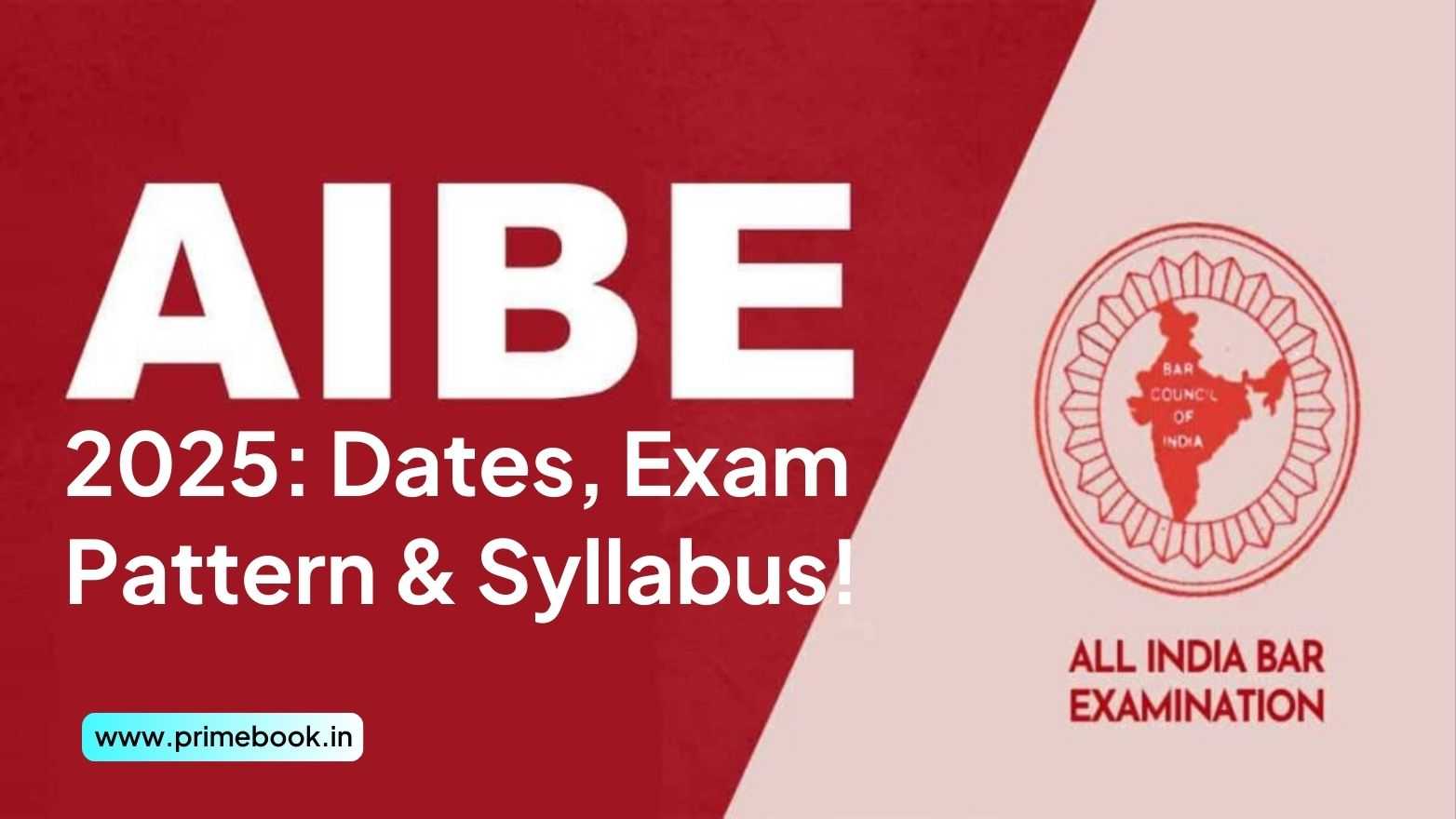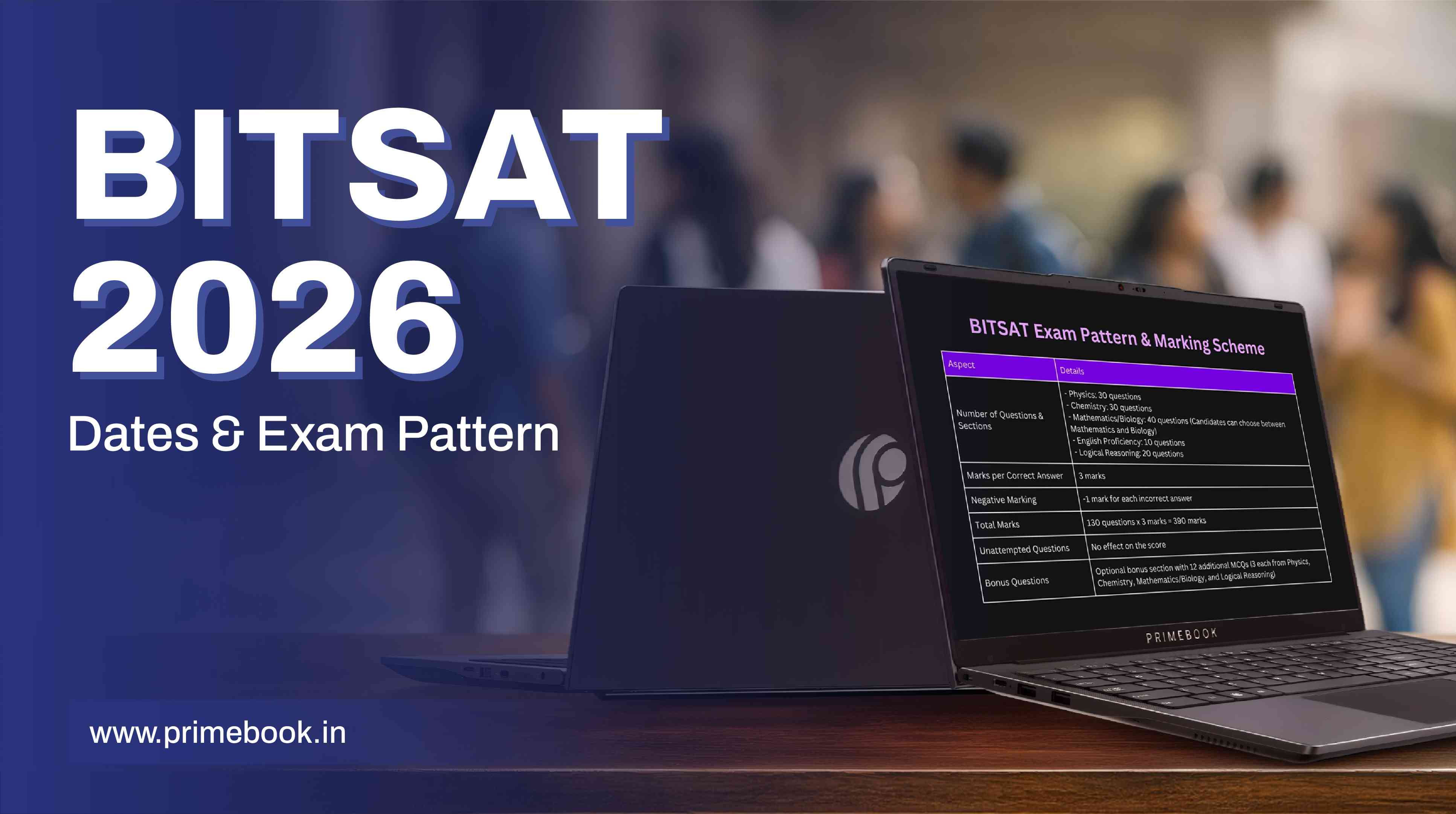Blogs / Student's Corner / AIBE 2025: Dates, Exam Pattern & Syllabus!
Blogs / Student's Corner / AIBE 2025: Dates, Exam Pattern & Syllabus!

Primebook Team
23 May 2025

AIBE 2025: Dates, Exam Pattern & Syllabus!
Finishing law school is a milestone, but it’s not the finish line. It’s because clearing the AIBE (All India Bar Examination) is non-negotiable if you have a career goal of becoming a lawyer in India with authorized certification to practice. The exam ensures that before you begin practicing in court, you have a solid grip on the legal subjects that matter most. While the official notification for AIBE 2025 is yet to roll out, having a clear idea of the dates, eligibility, exam pattern, and syllabus will help you prepare more purposefully. That’s where this blog will assist you! Read to start your AIBE preparation with the right focus.
Overview of AIBE 2025
The All India Bar Examination (AIBE) is a national-level qualifying exam that assesses whether a law graduate is eligible to practice law in India. Conducted by the Bar Council of India (BCI), AIBE grants you the Certificate of Practice (CoP), which is the official license to represent clients and argue cases as an advocate in any Indian court.
AIBE 2025 is likely to be conducted across approximately 55 cities in India, offering wide regional accessibility for enrolled candidates. To be eligible for AIBE 2025:
-
You should be an Indian citizen.
-
You must have completed either a 3-year or 5-year LLB from a BCI-recognized institution.
-
You must be enrolled with any State Bar Council under Section 24(1)(f) of the Advocates Act, 1961.
However, there is no age limit to appear for the exam. For registration, you have to drop by their official website and follow the steps as instructed.
AIBE 2025 Important Dates
Based on the schedule followed in previous years, here’s the expected timeline for AIBE 2025.
|
Event |
Tentative Date |
|
AIBE 2025 Notification Release Date |
July 2025 |
|
AIBE 2025 Registration Start Date |
September 2025 |
|
AIBE 2025 Registration End Date |
October 2025 |
|
AIBE 2025 Admit Card Release |
November 2025 |
|
AIBE 2025 Exam Date |
December 2025 |
|
AIBE 2025 Provisional Answer Key Release Date |
December 2025 |
|
AIBE 2025 Final Answer Key Release Date |
January 2026 |
|
AIBE 2025 Result Declaration Date |
January 2026 |
*Please Note: These dates are tentative and subject to revision.
AIBE 2025 Exam Pattern
Although AIBE is a qualifying exam, not a competitive one, understanding its structure is still essential to avoid surprises on exam day. So, here it goes!
|
Particulars |
Details |
|
Exam Level of AIBE |
National |
|
Exam Frequency for AIBE |
Once a year |
|
Mode of AIBE 2025 Examination |
Offline (pen-and-paper based) |
|
AIBE Exam Duration |
3 hours and 30 minutes |
|
AIBE Type of Questions |
Multiple Choice Questions (MCQs) |
|
Total Questions in AIBE |
100 |
|
Total Marks in AIBE |
100 |
|
Negative Marking |
Not applicable |
|
Language Options |
22 (including English, Hindi, and other regional languages) |
There is no sectional time limit or subject-wise division in the paper. You're free to attempt the questions in any order within the total duration.
AIBE 2025 Syllabus
The AIBE syllabus is drawn from the core subjects taught during your LLB course. A total of 19 subjects are covered in the paper, and each carries a specific weightage. Your preparation should focus on understanding legal fundamentals, especially with recent updates like the Bharatiya Nyaya Sanhita (BNS), Bharatiya Nagarik Suraksha Sanhita (BNSS), and Bharatiya Sakshya Adhiniyam (BSA) now replacing IPC, CrPC, and the Indian Evidence Act in the syllabus.
Here’s the subject-wise breakdown for AIBE 2025.
Constitutional Law Syllabus
-
Fundamental Rights and Duties
-
Directive Principles of State Policy
-
Structure and functions of Parliament and the Judiciary
-
Emergency provisions
-
Centre-State relations
Indian Penal Code & Bharatiya Nyaya Sanhita (BNS) Syllabus
-
General exceptions and classifications of offences
-
Offences against the body and property
-
Criminal liability and punishments
-
Recent reforms under BNS
Criminal Procedure Code & Bharatiya Nagarik Suraksha Sanhita (BNSS) Syllabus
-
Arrest, bail, and remand procedures
-
Cognizable vs non-cognizable offences
-
Role of police and magistrates
-
Recent procedural updates under BNSS
Code of Civil Procedure (CPC) Syllabus
-
Jurisdiction of civil courts
-
Types of suits and pleadings
-
Execution of decrees
-
Appeals and revisions
Evidence Act & Bharatiya Sakshya Adhiniyam (BSA) Syllabus
-
Types of evidence and admissibility
-
Presumptions and burden of proof
-
Cross-examination rules
-
Digital and documentary evidence
Contract Law & Specific Relief Act Syllabus
-
Offer, acceptance, and consideration
-
Breach of contract and remedies
-
Specific performance and injunctions
-
Quasi-contracts
Family Law Syllabus
-
Marriage, divorce, and maintenance under personal laws
-
Adoption and guardianship
-
Inheritance and succession laws
Law of Torts, Consumer Protection & MV Act Syllabus
-
Negligence and strict liability
-
Defamation and nuisance
-
Consumer rights and redressal mechanisms
-
Provisions under the Motor Vehicles Act
Property Law Syllabus
-
Transfer of property and related doctrines
-
Easements and licenses
-
Mortgages and leases
Negotiable Instruments Act Syllabus
-
Cheques, promissory notes, and bills of exchange
-
Dishonour and penalties under Section 138
Company Law Syllabus
-
Incorporation and types of companies
-
Role of directors and shareholders
-
Corporate governance principles
Environmental Law Syllabus
-
Major environmental statutes (e.g., EPA 1986, Forest Act)
-
Principles like sustainable development and the polluter pays
Cyber Law Syllabus
-
IT Act provisions on data protection and digital evidence
-
Cybercrimes and jurisdiction
Labour & Industrial Law Syllabus
-
Industrial Disputes Act, Trade Union Act
-
Minimum wages, gratuity, and employee benefits
Professional Ethics & BCI Rules Syllabus
-
Advocate’s duties towards client, court, and society
-
Professional misconduct and disciplinary proceedings
-
Relevant case laws
Alternative Dispute Resolution (ADR) Syllabus
-
Arbitration, mediation, and conciliation
-
Lok Adalats and Legal Services Authority
Public Interest Litigation (PIL) Syllabus
-
Scope and admissibility
-
Landmark PIL judgments
-
Role of the judiciary in social justice
Administrative Law Syllabus
-
Principles of natural justice
-
Delegated legislation
-
Judicial review of administrative actions
Taxation Law Syllabus
-
Basics of income tax, GST
-
Constitutional framework of taxation
-
Taxpayer rights and responsibilities
Intellectual Property Law Syllabus
-
Copyright, trademark, and patent basics
-
Infringement and remedies
Land Acquisition Act Syllabus
-
Public purpose definition
-
Compensation and rehabilitation provisions
To conclude, these early months, before the official dates are announced, are the ideal time to prepare with focus. Break down the syllabus into manageable sections, revisit key legal principles steadily, and practise under timed conditions to strengthen your recall and accuracy. A deliberate and consistent approach now will make all the difference when the exam draws near!
For more information on various national-level exams, keep an eye out for Primebook’s Student Corner.


 Related Blog
Related Blog









